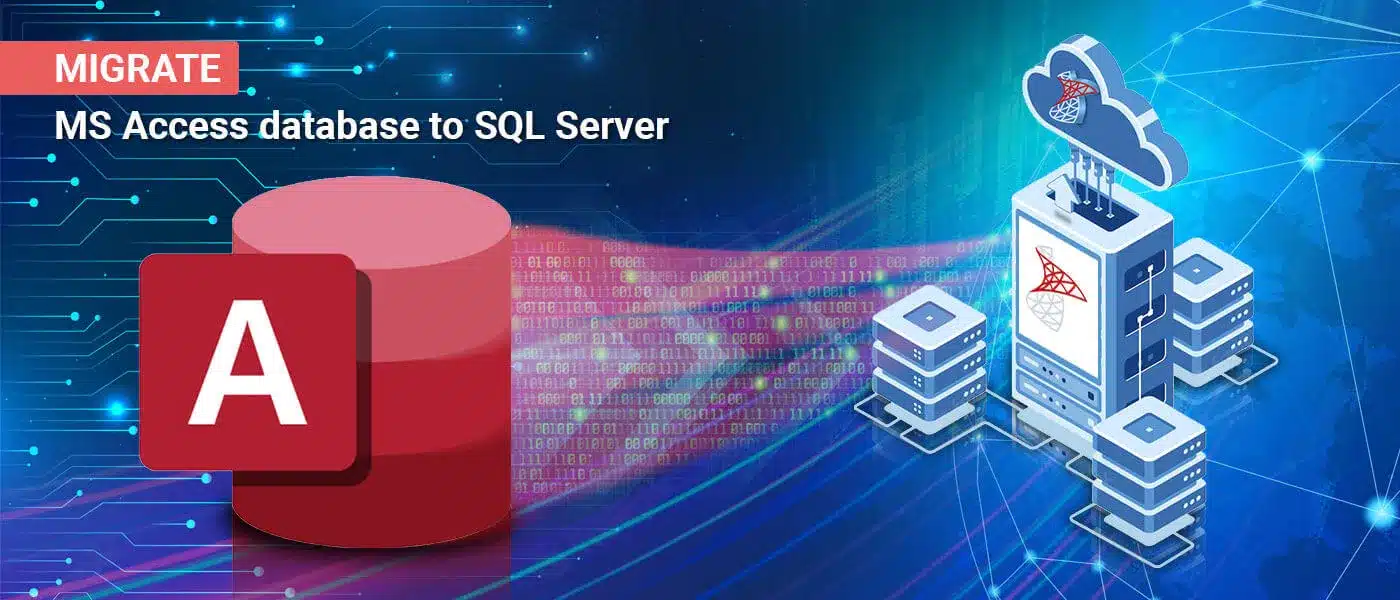Migrating your MS Access database to SQL Server for better performance and scalability
In the rapidly evolving business world of today, data has become the lifeblood for companies striving to gain a competitive edge. An effective database system, acting as the backbone for storing, organizing, and retrieving that data, has never been more critical. For many small businesses and individuals, Microsoft Access has been a trusted partner, fulfilling their database needs with its user-friendly, cost-effective, and efficient solutions. However, as businesses flourish, their data expands, and so does the need for a more robust and scalable database solution.
Does this sound familiar to you? Is your business growing at a pace that is overwhelming your MS Access database? If you’re noticing slower data retrievals, frequent system crashes, or inadequate support for multiple user access, then it’s probably time to consider a database migration. It’s time to consider migrating your MS Access database to SQL Server.
Overview
SQL Server, a product of Microsoft, is a high-powered, enterprise-level relational database management system (RDBMS) that offers significant improvements in performance, security, scalability, and reliability over MS Access. Businesses of all sizes use it, from startups to Fortune 500 companies, thanks to its comprehensive features and ability to handle massive volumes of data effortlessly.
A migration from MS Access to SQL Server could seem daunting, especially considering the potential complexity of transferring data, transforming database schema, and maintaining business continuity during the process. However, with strategic planning and expert help, the benefits far outweigh the challenges.
In this article, we will walk you through why and when you should consider migrating your MS Access database to SQL Server, what to expect during the migration process, and how your business can immensely benefit from this upgrade.
At PCApps, we are dedicated to ensuring that your business makes this transition smoothly, efficiently, and with minimal downtime. As experts in custom software and database development, we’ve successfully managed numerous such migrations, empowering businesses to harness their data’s true potential. For a limited time, we’re offering a free review of your project, where we can analyze your current setup, understand your business requirements, and provide you with a comprehensive migration strategy.
Stay with us as we embark on this journey of transformation, from MS Access to SQL Server, a step that promises to boost your business’s performance, growth, and data-driven decision-making capabilities.
Understanding the Limitations of MS Access
Microsoft Access, while a suitable choice for smaller operations, inevitably reveals certain limitations as your business scales up. One of its most significant challenges is the small file size limit. An Access database has a size restriction of 2GB, which might suffice for businesses dealing with minimal data. However, as the volume of data grows with the expansion of your business, this limitation can become a significant roadblock, causing system slowdowns, and restricting the volume of data you can store and manage.
Additionally, Access is designed to cater to a limited number of users, usually capping out around 255 concurrent users. While this might seem like a high number, as your business grows and more employees need access to the database, you may find your system struggling to cope, leading to inefficiency and frustration.
Access is known for its decreasing performance efficiency with large databases. It lacks the robust optimization and indexing features available in more powerful database platforms like SQL Server. Consequently, as your database grows, you might notice a significant reduction in speed and performance during data retrieval and updating, affecting your business’s operational efficiency and decision-making process. This gradual degradation of performance can become a critical problem, limiting your ability to make the most out of your data and compromising your competitive edge.
Unveiling the Benefits of Migrating to SQL Server
The migration from MS Access to SQL Server can open a host of benefits that can elevate your business operations to new heights. One of the standout advantages of SQL Server is its enhanced scalability. SQL Server is designed to handle a much larger volume of data compared to MS Access. This feature allows your business to grow without worrying about outgrowing your database, as SQL Server can manage databases as large as several terabytes.
Performance is another area where SQL Server shines. Its sophisticated data handling and optimization features offer improved performance even with large datasets. This means quicker data retrieval and updates, leading to faster, more efficient decision-making and smoother overall operations. SQL Server is designed for concurrency, making it an ideal choice for businesses that need multiple users to access and work on the database simultaneously, without slowing down the system.
SQL Server also offers a significant upgrade in terms of security. It comes equipped with robust security features that help protect your valuable business data from unauthorized access and breaches. SQL Server’s advanced security mechanisms, such as transparent data encryption, row-level security, and dynamic data masking, ensure your data remains secure and private.
SQL Server boasts a wide array of features and functionalities that MS Access does not provide. This includes advanced analytics, comprehensive data integration services, reporting services, and more. These added features give your business the tools to transform data into actionable insights, streamline workflows, and improve data governance, further empowering your business to thrive in the data-driven market of today.
Simply put, migrating to SQL Server provides a much-needed database upgrade that can take your business to the next level of growth and competitiveness.
Navigating the Challenges of Migrating to SQL Server
While the benefits of migrating to SQL Server are significant, it is essential to understand and prepare for the potential challenges that could arise during the process. One such hurdle is data compatibility issues. MS Access and SQL Server use different data types and structures, and a direct one-to-one mapping is not always possible. This requires careful planning and execution to ensure data is accurately transferred and properly formatted in the new system.
The cost of licensing is another consideration. While MS Access comes bundled with Microsoft Office, SQL Server is a separate product with its own licensing costs. Depending on the edition you choose, these costs can be significant, especially for larger businesses. It’s important to analyze your needs and select the edition that offers the best balance of cost and features for your business.
Migrating to SQL Server requires a certain level of technical expertise. The complexity of SQL Server’s environment is far greater than that of MS Access. This means you will need skilled resources familiar with SQL Server to set up, maintain, and optimize your new database. This could involve hiring new staff or training your existing team, both of which involve additional costs and time.
These challenges might seem daunting, but with the right guidance and strategy, they can be managed effectively. At PCApps, we have a team of experts who are adept at handling these challenges, ensuring a seamless and efficient migration to SQL Server. This ensures your business can quickly start reaping the benefits of the new database system, offsetting the initial costs and complexities of the migration process.
Embarking on the Migration Journey: Key Steps in the Process
Migrating your MS Access database to SQL Server is a process that requires careful planning and execution. Here are the key steps involved in this process:
- Prepare Your Access Database: The first step is to prepare your MS Access database for migration. This involves ensuring that your database is compatible with SQL Server and that your data is in the correct format. Data cleaning and normalization, resolving any existing issues with your database, and creating a comprehensive backup are vital components of this step.
- Choose a Migration Method: There are two main ways to migrate an Access database to SQL Server: manually and using a migration tool. Manual migration involves creating a new database in SQL Server and then moving your data across from Access. This approach allows for greater control but can be time-consuming and requires a high level of SQL Server expertise. On the other hand, various migration tools can automate a large part of this process, making it quicker and less prone to human error. The optimal method depends on your business’s unique needs, resources, and expertise.
- Migrate Your Data: Once you’ve prepared your Access database and chosen your migration method, the next step is to migrate your data. This involves transferring all your tables, queries, forms, and reports from Access to SQL Server. If you’re using a migration tool, this step could be as simple as a few clicks. If you’re migrating manually, you’ll need to create equivalent tables in SQL Server and then import your data, keeping in mind any necessary transformations due to differences in data types between the two systems.
- Test Your Migrated Database: Once your data has been migrated, it is crucial to thoroughly test your new SQL Server database. This testing should involve verifying data integrity, performance testing, and ensuring that all queries, forms, and reports work correctly in the new environment. This is a critical step to avoid any operational disruptions or data inconsistencies once you switch over to the new system.
Each of these steps requires a certain degree of technical knowledge and experience, and that’s where our team at PCApps can support your business. We provide comprehensive migration services, leveraging our expertise to ensure your migration process is seamless, efficient, and set up for success.
Best Practices for Data Validation Post-Migration
Migrating your data from MS Access to SQL Server is just the first step. Validating your data post-migration to ensure everything is working correctly is equally important. Here are some best practices to follow:
- Check for Data Integrity Issues: Post-migration, it is critical to check for any data integrity issues. This involves verifying that all the data was accurately transferred, that the relationships between your tables have been maintained, and that your data is consistent and accurate. Tools are available to automate these checks, or they can be done manually, depending on your preference and resources.
- Recreate Any Access-Specific Objects: Some objects in your Access database, like forms, reports, and specific queries, may not have direct equivalents in SQL Server. It’s important to recreate these in your new SQL Server environment or find suitable alternatives. This might require modifying your applications to accommodate the new SQL Server-specific objects.
- Test Your Applications: After the data migration, it’s vital to test your applications thoroughly to make sure they are still working correctly with your new SQL Server database. This should include testing all functionalities that interact with your database, ensuring that your applications can successfully read from and write to the new database, and that performance has not been adversely impacted by the migration.
At PCApps, we emphasize these post-migration validation steps in our comprehensive migration process. We understand that the true measure of a successful migration is not just getting your data into the new system, but ensuring that your business continues to function seamlessly and even more effectively once the migration is complete. With our expert team, we ensure every aspect of your database migration is handled with meticulous attention to detail and a commitment to your business continuity and success.
Steering Clear of Common Migration Pitfalls
Migration of databases from MS Access to SQL Server, while beneficial, comes with a set of challenges that, if not handled properly, can lead to common pitfalls. Here are some measures to avoid them:
- Understand the Migration Process: Understanding the migration process in-depth is key. It is essential to familiarize yourself with both the MS Access and SQL Server environments, understand the differences, and have a clear plan for mapping your data, objects, and applications from one to the other.
- Back Up Your Data: One of the most critical steps before initiating the migration process is backing up your data. Unexpected problems can occur during the migration, and having a backup ensures you have a safety net to fall back on. This can save you from potential data loss and provide peace of mind throughout the migration process.
- Test Your Migrated Database Thoroughly: As emphasized earlier, testing your migrated database thoroughly is crucial. This should involve both data validation and performance testing to ensure your new SQL Server database not only contains all your data accurately but also functions efficiently.
- Get Professional Help: If the migration process seems too complex or time-consuming, it is wise to seek professional help. Experts in the field, like our team at PCApps, have the experience and knowledge to handle the migration smoothly, ensuring all potential issues are anticipated and addressed effectively.
Remember, migrating to SQL Server is not just about transferring data; it’s about setting up a new, more efficient environment that can drive your business growth. By taking these measures to avoid common pitfalls, you can ensure a successful migration that sets your business up for long-term success.
Embrace the Future with SQL Server Migration
In an era where data drives business growth, transitioning from MS Access to SQL Server can be the game-changer your business needs. While Access offers a robust platform for small operations, its limitations in terms of file size, user capacity, and performance with large databases may hinder your business’s growth trajectory. Conversely, SQL Server brings enhanced scalability, improved performance, robust security features, and a wealth of functionalities that can significantly improve your data management capabilities.
However, the migration process is not without its challenges, including data compatibility issues, licensing costs, and the need for technical expertise. It also involves meticulously planned steps: preparing your Access database, choosing the right migration method, transferring data, and comprehensive post-migration testing. And while there are common pitfalls in the process, these can be avoided by thoroughly understanding the migration process, having robust data backups, extensive testing, and seeking professional help when needed.
At PCApps, we understand these complexities and have a team of experts ready to assist. We handle every step of the migration process, from the initial preparation to post-migration data validation, while ensuring a smooth, efficient transition that minimizes operational disruptions. We’re here to guide you through this transformative process, helping you leverage the full potential of SQL Server for your business growth.
Don’t let the intricacies of database migration hold you back from improving your data management capabilities. Reach out to our team at PCApps for a free review of your project. Let us help you make this transition seamlessly, enabling you to focus on what truly matters – growing your business.



